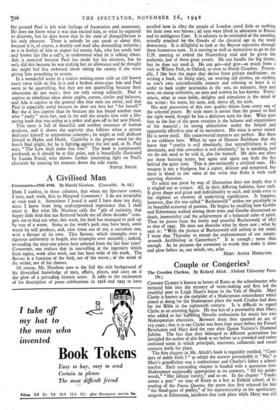A Civilised Man
'Comments-1945-1948. By Harold Nicolson. (Constable. 8s. 6d.)
DARE I confess, in these columns that when my Spectator comes, I turn, each week, first to Marginal Comment ? I do not invariably at once read it. Sometimes I hoard it until I have done my duty, since I know from long undisappointed experience that I shall enjoy it. But what Mr. Nicolson calls the "gift of curiosity, that happy little bird that has fluttered beside me all these decades" corn- pels me to find out what, this week, the bird has managed to pick up by way of a worm. Stony as the week's path may have been, some worm he will produce, and, nine times out of ten, a succulent one, with a flavour of its own. This flavour, which triumphs over a rigorous uniformity in length, also triumphs over assembly ; indeed, re-reading the sixty-one pieces here selected from the last four years' Comments, one realises that in marvelling at the ingenuity which finds topics, week after week, one has been wide of the mark. The flavour is a function of the bird, not of the worm ; of the mind of the writer, not of his themes.
Of course, Mr. Nicolson uses to the full the rich background of his diversified knowledge of men, affairs, places, and casts on it the glow of a pervading historic sense. It adds to the excitement of his description of peace celebrations in 7918 and 1945 to have recalled how in 18z5 the people of London cared little or nothing for their own war heroes ; all eyes were lifted in adoration to Russia and its ambiguous Czar It is salutary to be reminded of the meaning actually attached by-the Greeks of the classical age to the word democracy. It is delightful to look at the Bayeux tapestries through these humorous eyes. It is moving as well as instructive to go to the U.N. meeting or attend the Nuremberg trial and be given the authentic feel of these great events. He can handle the big theme, but he does not need it. He can get—and give—as much from a visit to Wilton Park, to Oxford, or even to North Croydon. Person- ally, I like best the pages that derive from private meditation: on writing a book, on being sixty, on wearing old clothes, on sticking to one's own uncomfortable country and refusing to leave it in order to bask under jacarandas in the sun, on manners, then and now, on stamp collectors, on men and women he has known. Every- where, what at once holds, delights and stimulates is the mind of the writer: his sense, his taste, and, above all, his style.
His easy possession of this rare quality shines from every one of the selected pieces. By style more is meant than the power to find the right word, though he has a delicious turn for that. What puts him in the line of the great essayists is the balance and organisation of his material ; its strong articulation under the limpid and apparently effortless ease of its movement. His voice is never raised. He is never shrill. His controversial manners are perfect. But there is no coldness here. When he says of Eleanor Rathbone that she knew that "cruelty is evil absolutely, that untruthfulness is evil • absolutely, and that cowardice is evil absolutely," he is speaking, and we do not need to be told it, also for himself. He does not often use these burning terms but again and again one feels the fire behind the quiet tone. This is pre-eminently a civilised man. His weapon is not a bludgeon but a rapier, delicate and tempered, but there is blood in the veins of the wrist that flicks it with such unerring direction. To select one piece by way of illustration does not imply that it is singled out as unique. All, in their differing fashions, have style. It gives shape and grace and individuality to each, and lends even to the slightest an element of underlying significance. It happens, however, that the one called" Buchenwald" strikes me peculiarly in its beautiful economy of passion. He begins by recalling how Goethe and Eckemiann walked among these trees and Goethe discoursed on death, immortality and the achievement of a balanced calm of spirit. Then he passes from the lovely and peaceful Buchenwald of 1827 to that of 1945. He does not describe what he there saw; what he says is : "With the picture of Buchenwald still aching in my mind, I went that Thursday to attend the enthronement of our ninety- seventh Archbishop at Canterbury." It is enough ; more than enough. As he pictures the ceremony in words that make it shine and glow before us, our minds, too, ache. MARY AGNES HAMILTON.




































 Previous page
Previous page